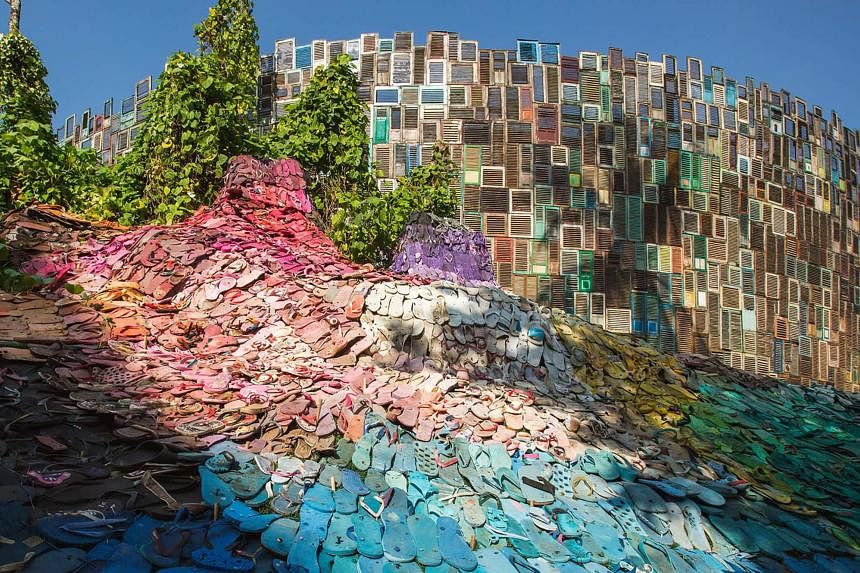BALI – In 2016, I was getting my freediving certificate at Amed on the east coast of Bali.
So traumatised was I that day, that I still remember the details clearly. At the magic hour of 3pm, while I was doing my qualifying dives in the open sea, some sort of floodgate opened and a torrent of trash was unleashed into the sea.
I found myself in a vortex of Indomie wrappers and other rubbish. The only thing on my mind was that I had to get out of the water.
I had a ticklish sensation in my throat that night and by the next morning, I had a throat infection.
The incident changed the way I looked at the island. While Bali still beckons with its friendly locals, delicious nosh, and Seminyak’s cool bars and mid-scale designer boutiques that channel Ibiza, its rubbish problem is staggering.
Sungai Watch (sungai.watch), an Indonesian non-governmental organisation, reports that it pulls some 3,000kg of plastic from Bali’s rivers and illegal landfills daily.
So, when I am invited to visit Desa Potato Head, I say yes.
During the 2022 Singapore Design Week, the Potato Head group held a joint exhibition, N*thing Is Possible, with design firm OMA that unveiled the reality of Bali’s rubbish problem.
It offered a glimpse into what Potato Head has been doing to tackle the issue, and reminded people that they play a role in saving the environment.
I want to see these efforts for myself on my Bali trip. Desa Potato Head is a lifestyle brand comprising a mix of hospitality and food and beverage (F&B) outfits rolled into one estate where music, art, design, food and wellness come together to inspire travellers.
It is made up of a beach club, two hotels (which have a total of 225 rooms and suites), a holistic wellness centre, and seven restaurants and bars.
Spud beginnings
Potato Head started off as a beach club. By 2015, Katamama (renamed Potato Head Suites), an all-suite hotel designed by Indonesian architect Andra Matin, was added to the beach club. The bars and restaurants came along.
In 2021, Potato Head Studios – designed by David Gianotten of OMA, the architectural practice of Dutch Pritzker prize laureate Rem Koolhas – was opened.
While going green is de rigueur for hotels these days, sustainability has underpinned the group’s operations since day one.
After all, Potato Head Beach Club’s attention-grabbing, Colosseum-inspired facade, made of 6,600 repurposed window shutters, has melded with Seminyak’s hip and vibrant landscape over the past decade.

Indonesia-born founder-owner Ronald Akili had, from the start, a vision to build a creative eco-village (“desa” is Bahasa for village) for a community of like-minded guests who are into music, creative arts and making the world a better place.
And Potato Head Studios marks the fulfilment of the Singapore resident’s decade-long vision.
Spread around the estate are many art installations made with repurposed materials that have environmental messages at their core.
Pointman – River Warrior, a recent addition, is a sculpture made from repurposed waste materials collected from the waterways in Bali as a social commentary on pollution.
My Oceanfront Studio in Potato Head Studios has a balcony and sunset views. The open-concept room is designed in a modular form with clearly demarcated areas for different activities.
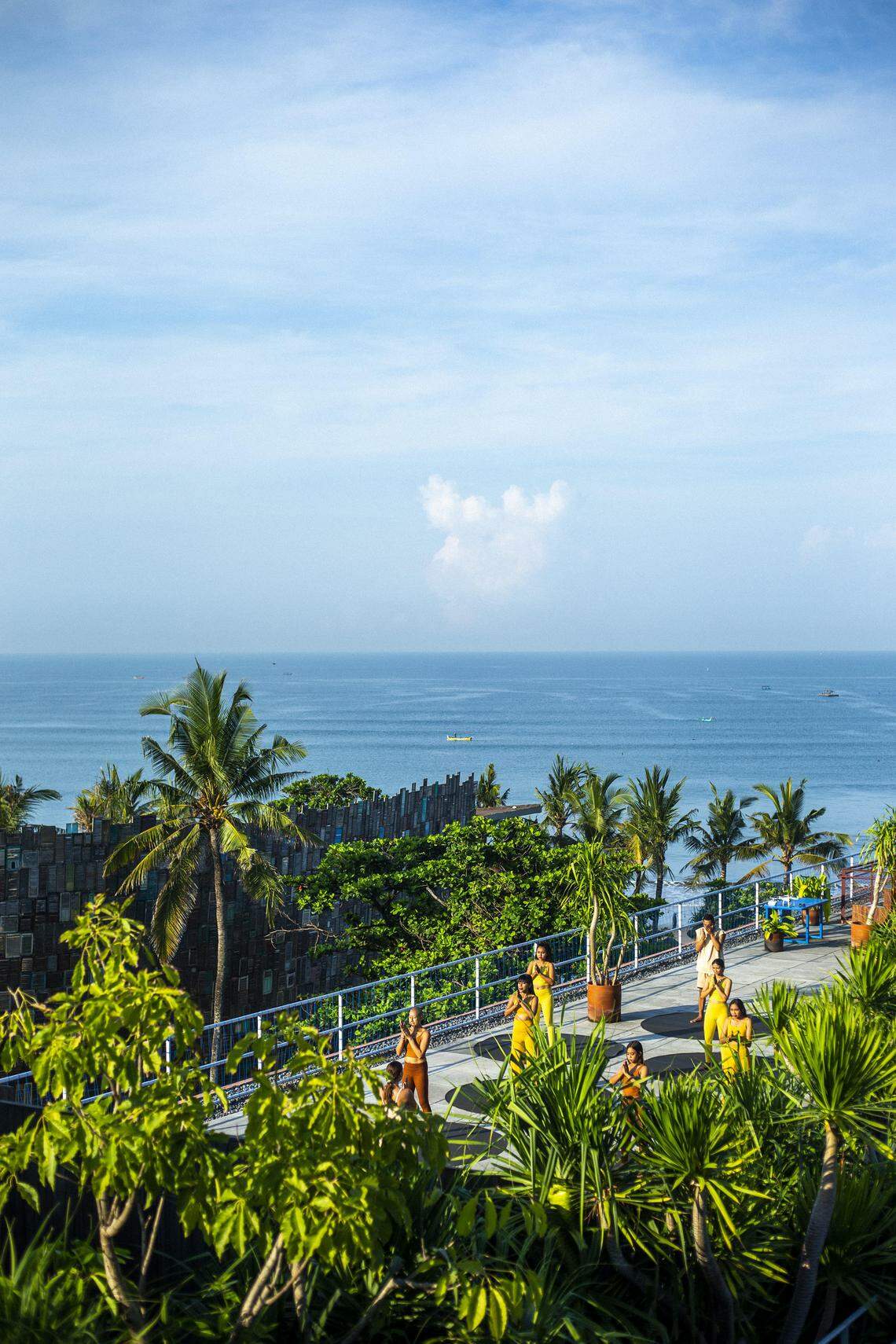
Apart from the pops of colour from soft furnishings, such as ikat tapestries by Bali-based natural-dye studio Tarum, the room is clad almost entirely in honey hues, with built-in furniture made from recycled wood – including the large Japanese-style bathtub.
In the room are discoveries that one would not expect to see in a luxury hotel, like a speckled rough-hewn chair, the toothbrush and soap dispenser holders, and candle holders.
With their rough finish, they look a little like school projects. But I appreciate that they are made from upcycled materials such as shredded and reconstituted plastic from mineral water bottle caps.
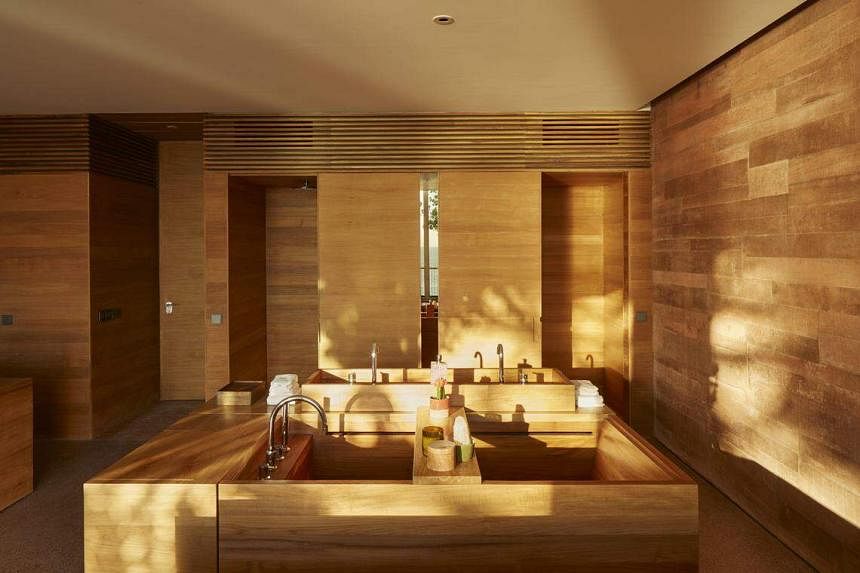
Potato Head upcycles up to 97 per cent of its waste into furniture (up from 50 per cent in 2017), candles, compost and even rubbish bins.
Memorabilia, such as a bracelet with beads made from the ubiquitous Aqua water bottle caps and strung with elastic from discarded masks, are gifted to guests when they leave.
I learn the details during a sustainability tour of their waste management facility, which Potato Head offers to guests.
Dumpster tour
We start the tour by visiting the area where rubbish is sorted, whether for composting, recycling or upcycling.
A variety of waste from different types of coloured plastic and even styrofoam, which cannot be recycled, is shredded, melted or degraded and sometimes mixed with crushed oyster shells from the hotel’s seafood restaurant.
The resulting goopy mixture is then poured into moulds for making tissue boxes and soap dispensers. Reconstituted, colour-speckled plastic can also be laser-cut into components for making chairs and other furniture around the resort.
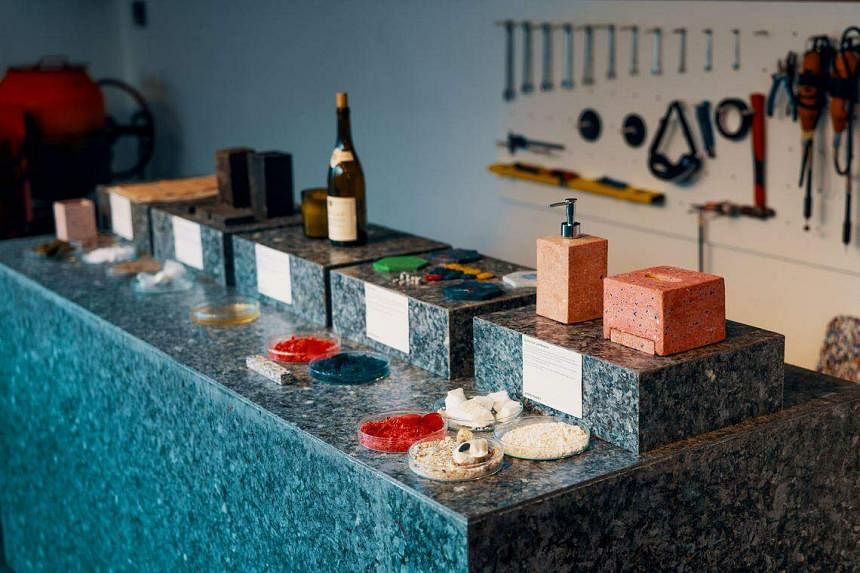
I learn that while filling the cavernous wooden bathtub takes nearly an hour because a lot of water is required, none of that is wasted, as it is treated and recycled for watering the plants on the estate.
F&B outlets create a lot of waste – and there are a total of seven restaurants and bars here. How does Potato Head deal with them?
Leftovers are sent to a pig farm, while organic waste is upcycled into compost. Thirty per cent of the used cooking oil is mixed with kerosene to become wax for candles.
The remaining 70 per cent is treated and turned into biofuel by a local non-profit for the nearby Green School’s Bio Bus Programme.
The receptacles for holding the candles are made from recycled wine bottles, which are also turned into drinking glasses.
Big on flavour
Sustainability in a hotel is great, but what about the food?
In its efforts to run its F&B operations on an ethos of sustainability and social responsibility, Desa Potato Head has not compromised on taste.
Kaum, which specialises in Indonesian cuisine, uses recipes from over 600 of Indonesia’s ethnic groups, some of which are passed down from generation to generation.
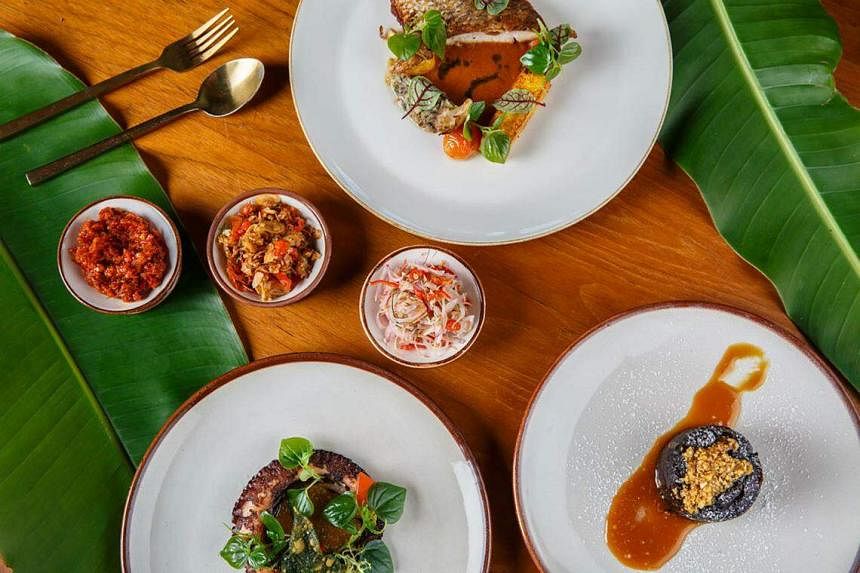
A must-try is the bebek goreng sambal mangga muda (220,000 rupiah or S$19). The crispy duck, served with a spicy green mango and red chilli sambal, is a potent mix of spicy, tart and sweet.
Ijen, a zero-waste restaurant, serves simple and fresh seafood dishes which are big on flavour.
There is a plant-based restaurant, of course. I occasionally seek meat-free options when travelling, as I am often amazed by the wonderful finds in places known for rich produce.
However, my dinner at plant-based Tanaman scores in creativity but not in substance.
Share the good stuff
Potato Head hopes to influence its neighbours and build up a community of like-minded operators in Bali. By end-2023, its Collective Waste Centre will be open.
The centre, which costs US$200,000 (S$274,000) to build, will service neighborhood hospitality and F&B businesses with the aim of getting their landfill contributions down to 5 per cent.
Desa Potato Head
Where: Jl. Petitenget No.51B, Kerobokan Kelod, Kec. Kuta Utara, Kabupaten Badung, Bali 80361, Indonesia
Rooms: 168 rooms at Potato Head Studios, and 57 suites at Potato Head Suites
Rates: From IDR 3,300,000 (S$293) for a room, and IDR 6,150,000 for a suite
Info: seminyak.potatohead.co
- A former journalist, Mavis Teo is the founder of a media outreach consultancy and a freelance travel writer. She was hosted by Desa Potato Head.
